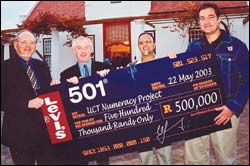Oldest brand of denims helps student numeracy
27 May 2003
Denim cheque: (From left) Prof Martin West, Prof Ian Scott, Robert Prince, Numeracy Centre co-ordinator, and Mike Joubert, general manager Levi Strauss South Africa at the donation ceremony.
World famous Levi's® jeans are 150 years old this year and they're going back to 'school'.
To celebrate its birthday, the Levi Strauss® Foundation has donated half a million rand to the University of Cape Town's Numeracy Centre to help bridge the gap in mathematics for students in the Western Cape.
The Numeracy Centre based at UCT's Faculty of Higher Education Development was established four years ago to provide supplementary Mathematical Literacy tuition for under-graduates.
The centre assists more than 400 undergraduates each year who are enrolled in quantitative social sciences like Economics, Psychology and Sociology.
The funding - which will provide financial stability for the Centre and opportunities for curriculum development - was presented by Levi Strauss® South Africa head, Mike Joubert to Vice Chancellor Prof Njabulo Ndebele in the form of a denim Levi® 'cheque'.
Joubert, who has breathed new energy into the Levi® brand in South Africa and who has been closely associated with literacy promotion for many years jokingly suggested it was time for formal academic gowns to make way for students' self-imposed campus dress code of denim.
Robert Prince the Numeracy Centre's co-ordinator said the funding would go a long way to bridge the gap in Mathematics education, which is "highly deficient in large sections of the school system in South Africa".
"Many of our University courses require students to master mathematical components, of varying degrees of complexity and the Numeracy Centre provides the supplementary teaching needed.
"Our primary objective is to ensure that those who have successfully earned a place at UCT will not be deterred from successfully completing their degrees because they do not have a firm grasp of the mathematics components required for their courses. Our long-term goal is to ensure that all UCT graduates are quantitatively literate."
He said the donation would support the introduction of a 1st year course which is part of the "Gateway to Quantitative Social Sciences" and which would benefit about 30 students.
The Numeracy Centre provides a variety of courses and interventions catering to the requirements of Economics, Health Sciences, Law, Psychology and Sociology students and students doing a Diploma in Human Resources Management. The Centre also offers a "Quantitative Literacy" course for corporate students.
In addition the Centre conducts Numeracy Competency testing for the University's annual intake of over 1 000 students and serves in an advisory capacity when curricula are developed in the Humanities, Health Sciences, Law, Commerce and Science faculties.
Its courses vary from 6 hours per week throughout the academic year for the 1st years, to 30 hours over the course of one semester for third year Sociology students.
Several of the courses have been designed with built-in computer-assisted learning modules consisting of "interactive Excel-based computer tutorials." These develop students' computer literacy within the context of their studies and are very popular.
 This work is licensed under a Creative Commons Attribution-NoDerivatives 4.0 International License.
This work is licensed under a Creative Commons Attribution-NoDerivatives 4.0 International License.
Please view the republishing articles page for more information.
Related
Cape Town’s wildflowers: six key insights from a new checklist
19 Feb 2026
Republished










